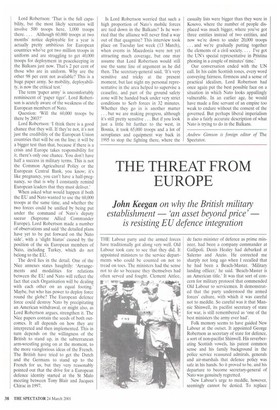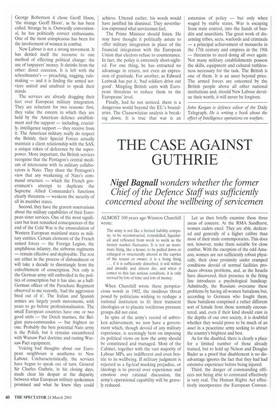THE THREAT FROM EUROPE
John Keegan on why the British military
establishment — 'an asset beyond price' is resisting EU defence integration
THE Labour party and the armed forces have traditionally got along very well. Old Labour took care to see that they did. It appointed ministers to the service departments who could be counted on not to tread on toes. The ministers had the sense not to do so because they themselves had often served and fought. Clement Attlee,
IMF' 1
de facto minister of defence as prime minister, had been a company commander at Gallipoli. Denis Healey had debarked at Salerno and Anzio. He corrected me sharply not long ago when I recalled that he had been a Beach-Master. 'Military landing officer,' he said. 'Beach-Master is an American title.' It was that sort of concern for military protocol that commended Old Labour to servicemen. It demonstrated that the party understood the armed forces' culture, with which it was careful not to meddle. So careful was it that Mannie Shinwell, its pacifist secretary of state for war, is still remembered as 'one of the best ministers the army ever had'.
Folk memory seems to have guided New Labour at the outset. It appointed George Robertson as secretary of state for defence, a sort of non-pacifist Shinwell. His reverberating Scottish vowels, his patent common sense and his family background in the police service reassured admirals, generals and air-marshals that defence policy was safe in his hands. So it proved to be, and his departure to become secretary-general of Nato was genuinely regretted.
New Labour's urge to meddle, however, seemingly cannot be denied. To replace George Robertson it chose Geoff Hoon, 'the strange Geoff Hoon', as he has been called. Strange he is. Outwardly conventional, he has politically correct enthusiasms. One of the most conspicuous has been for the involvement of women in combat.
New Labour is not a strong movement. It has denied itself the recourse to one method of effecting political change: the use of taxpayers' money. It shrinks from the other: direct coercion. It is left with the schoolmaster's — preaching, nagging, rulemaking — and it is finding the armed services united and unafraid to speak their minds.
The services are already dragging their feet over European military integration. They are reluctant for two reasons: first, they value the esteem in which they are held by the American defence establishment and the support — including, crucially, intelligence support — they receive from it. The American military really do respect the British; their Special Forces actually maintain a client relationship with the SAS, a unique token of deference by the superpower. More important, the British services recognise that the Pentagon's central medium of intercourse with its military collaborators is Nato. They share the Pentagon's view that any weakening of Nato's command structure — which the French government's attempt to duplicate the Supreme Allied Commander's functions clearly threatens — weakens the security of all its member states.
Second, they have the gravest reservations about the military capabilities of their European sister services. One of the most significant but least remarked consequences of the end of the Cold War is the emasculation of Western European mainland states as military entities. Certain elements of the French aimed forces — the Foreign Legion, the amphibious infantry, the airborne regiments — remain effective and deployable. The rest are either in the process of disbandment or will take a decade to disentangle from the enfeeblement of conscription. Not only is the German army still embroiled in the politics of conscription but it has also, as a halfGerman officer of the Parachute Regiment observed to me recently, 'had the aggression bred out of it'. The Italian and Spanish armies are largely youth movements, with years to go before professionalisation. The small European countries have one or two good units — the Dutch marines, the Belgian para-commandos — but frighten no one. Probably the best potential Nato army is the Polish, but it remains encumbered with Warsaw Pact doctrine and rusting Warsaw Pact equipment.
Voicing bad thoughts about our European neighbours is anathema to New Labour. Uncharacteristically, the services have begun to speak out of turn. General Sir Charles Guthrie, in his closing days, made clear his despair at the disparity between what European military spokesmen promised and what he knew they could achieve. Uttered earlier, his words would have justified his dismissal. They nevertheless expressed what servicemen feel.
The Prime Minister should listen. He may have thought it politically astute to offer military integration in place of the financial integration with the European Union that electors refuse to countenance. In fact, the policy is extremely short-sighted. For one thing, he has extracted no advantage in return, not even an expression of gratitude. For another, as Edward Luttwak has put it, tad soldiers drive out good'. Mingling British units with European threatens to reduce them to the Europeans' level.
Finally, had he not noticed, there is a dangerous world beyond the EU's boundaries. The Clausewitzian analysis is breaking down. It is true that war is an extension of policy — but only when waged by stable states. War is escaping from state control, into the hands of bandits and anarchists. The great work of disarming tribes, sects, warlords and criminals — a principal achievement of monarchs in the 17th century and empires in the 19th — threatens to need doing all over again. Not many military establishments possess the skills, equipment and cultural ruthlessness necessary for the task. The British is one of them. It is an asset beyond price. The armed forces are esteemed by the British people above all other national institutions and, should New Labour devalue their worth, it will never be forgiven.
John Keegan is defence editor of the Daily Telegraph. He is writing a book about the effect of Intelligence operations on warfare.















































































 Previous page
Previous page